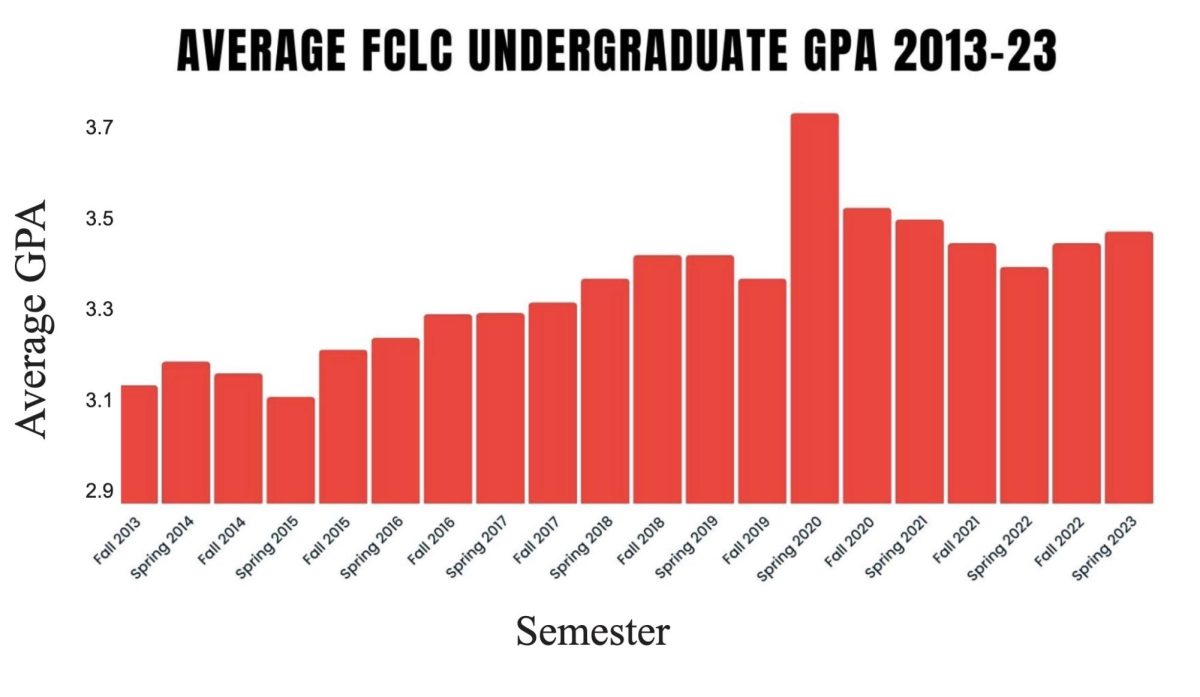Student grade point averages (GPA) at Fordham College Lincoln at Center (FCLC) have trended upward in the past 10 years, according to data from a grade analysis report produced by Fordham’s Department of Information Technology during the fall 2023 semester.
The rise in GPAs matches the nationwide “grade inflation” trend at colleges and universities, where students are earning higher marks on average. In the spring 2023 semester, Fordham students earned just below a 3.5 GPA on average, only one decimal point from the Dean’s List academic distinction.
Some members of Fordham’s community argued that rising GPAs are symptomatic of falling standards for college students, while others expressed that concern over grade inflation demonstrates how grade-based evaluations are structurally unfair.
Robert Moniot, associate dean for FCLC and chair of the Committee on Academic Progress, said that the rise in overall GPA suggests some professors are less rigorous in their assessments of students.
“One of the things about the grade inflation is that it cheapens the higher grades,” he said. “So if a lot of students are getting A’s, it suggests that the faculty member is not challenging the students.”
Moniot noted that grades are an imperfect measure of student learning, and often reflect external circumstances rather than a student’s academic performance. However, he believes the integrity of grades should be preserved as they remain important for admission decisions for post-graduate programs.
Some professors see rigorous grading as a professor’s responsibility to their students. Rosemary Wakeman, a history professor at Fordham’s Lincoln Center campus, said it is important to reserve A’s for a handful of submissions that demonstrate an extra level of research and analysis. She compared giving everyone A’s to not giving grades at all.
“It’s my responsibility as a professor who is supposed to be an expert in a field to provide steady information, a theoretical framework, but it’s the student’s responsibility to do the reading and to do the studying required as part of the learning process,” Wakeman said. “There’s no way for me to assess that without grades.”
The integrity of grades should be preserved as they remain important for admission decisions for post-graduate programs.
Mary Bly, an English professor and chair of Fordham University’s English department, said that higher grades on average are not necessarily a problem. Bly described grades as a tool to encourage students to study more closely and grow academically.
“I figure the better teacher I am, the more A’s I’m going to get,” Bly said.
Both Bly and Moniot shared that they were aware of classes at Fordham in which every student received an A, including students who did not attend a single class throughout the semester.
These situations suggest that some professors automatically award students with A’s at the end of the semester without regard for their performance in the class. Bly made particular note that these instances are very rare, and may occur when faculty members experience burnout.
Job insecurity may also impact the decisions professors make while grading. Representatives of Fordham Faculty United (FFU), the union representing the university’s non-tenure track faculty, suggested that some professors are afraid that giving strict grades could jeopardize their position.
Some professors will give higher grades to avoid conflict with students.
Cornelius Collins, an adjunct English instructor and a chief steward of FFU, said some professors will give higher grades to avoid conflict with students. Faculty can be fired for any reason in their first two years at Fordham, and Collins said a formal complaint about a grade could compromise their jobs.
“In this probationary period of employment instructors might be hesitant to get into any kind of conflict with a student who might complain so they might be giving a higher grade in that case because they feel they might not have the support of the department,” Collins said.
Bly believes that erroneous grade complaints, or course grade appeals, should not threaten a professor’s position.
“Grade complaints, we get a tremendous amount of them. And they do not make any difference in terms of whether we rehire someone,” Bly said. “We also get grade complaints that are really, grounded in reality, and we deal with those in a different way.”
Beyond course grade appeals, which consists of a grievance procedure, Moniot added that some faculty have expressed concerns that enrollment in their classes could dip if they are branded as a strict grader on popular websites such as ratemyprofessors.com.
“That’s definitely a valid concern,” he said. “They want to get good evaluations and have students flocking to their classes.”
Moniot added that students should assign less importance to grades and instead use their time at Fordham to learn new things in subjects they aren’t familiar with.
“The emphasis should be on learning,” he said. “I would like to see that sort of attitude grow amongst our students, that they aren’t so concerned about taking a course that’s in their comfort zones so that they can get an A rather than taking a course that might challenge them.”



